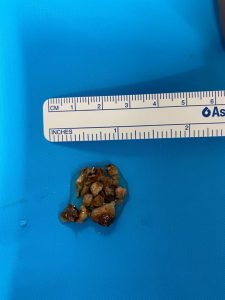Kidney Stone Surgery
Kidney stones form when minerals and acid salts clump together inside concentrated urine. They usually start off as microscopic particles which build up over time, forming larger stones as they go.

Not all kidney stones require surgical treatment (smaller stones may pass spontaneously or with medical treatment), however in some cases where larger stones are present, kidney stone surgery is warranted.
At Melbourne Urology Centre, our specialist urologists doctors Shekib Shahbaz and Tony De Sousa are highly experienced in the treatment of urological stone disease, including kidney stone surgery in Melbourne.

There are three main options in terms of kidney stone surgery. These are:
- Ureteroscopy and laser stone surgery
- ESWL (extracorporeal Shockwave Lithotripsy)
- PCNL (percutaneous nephrolithotomy)
Your surgeon will determine the most appropriate form of treatment for your condition, taking into account the size and location of the stone(s) as well as your medical history and other circumstances.
Who is suitable for kidney stone surgery?
In the initial stages of formation, most kidney stones do not cause painful symptoms. Sometimes they are discovered incidentally on an ultrasound or CT scan.
If left untreated, kidney stones can cause severe pain and even obstruction of the urinary tract, leading to serious symptoms.
Kidney stone surgery is indicated in patients who have symptomatic and non-symptomatic kidney stone disease. Some symptoms of kidney stones can include:
- Pain in the back or flank
- Sweating
- Nausea
- Blood in the urine.
When determining the type of kidney stone surgery that is most appropriate for the patient, the urologist will take into consideration factors such as:
- The overall size and shape of the stone(s)
- The location of the kidney stone(s) within the urinary tract
- Whether the kidney stones are causing the patient any symptoms
- The health of the kidney and the overall health of the patient.
What are the advantages of kidney stone surgery?
Kidney stone surgery techniques allow surgeons to effectively treat large and complex stones, relieving the painful symptoms that these types of stones often cause.
Each type of kidney stone surgery has its own benefits and drawbacks, and these are discussed with the patient during the consultation with the specialist urologist.
- ESWL is a non-invasive procedure that involves no incisions; most patients may resume normal activities within 1-2 days following the procedure
- Ureteroscopy and laser using Moses technology allows for virtually any stone type to be broken, provided it can be accessed with the surgeons ureteroscope
- PCNL allows the vast majority of patients to be cleared of even very large stones with a single procedure.
What to expect following kidney stone surgery?
Depending on the type of kidney stone surgery you have, you may be sent home on the same day, or the following day (for patients having a PCNL).
For ESWL kidney stone surgery, you can expect:
- Some mild abdominal discomfort or dull ache in the days following your procedure
- You may pass small stone fragments in your urine for some days
- Depending on the size and density of your kidney stones, you may require repeat shockwave therapy treatment.
For ureteroscopy and laser kidney stone surgery, you can expect:
- A resumption of normal, light activities usually within a few days following your procedure
- You may see some blood in your urine and feel the urge to urinate frequently in the days following your surgery
- If your surgeon has placed a stent, you will be advised when to return to have it removed (usually around a week following surgery)
For PCNL kidney stone surgery, you can expect:
- Some discomfort in the flank area for a few days following your surgery
- You may see some blood in your urine and feel the urge to urinate frequently in the days following your surgery
- A resumption of normal, light activities usually within a week following your procedure
- If your surgeon has placed a stent, you will be advised when to return to have it removed (usually around a week following surgery).
Following any type of kidney stone surgery, it is important that you drink plenty of water to help with flushing the stone fragments out of the urine. Good hydration is also important in the longer term, for the prevention of kidney stones. Whilst there is no specific recommendation as to how much water to drink, a good guide is the colour of your urine, which should be very pale yellow to clear.
Melbourne Urology Centre – Kidney Stone Surgery Melbourne
The specialist urologists at Melbourne Urology Centre are highly experienced in performing kidney stone surgery. Dr Shekib Shahbaz and Dr Tony de Sousa, along with their team are committed to providing all patients with the highest quality, individually tailored care.
With access to state-of-the-art facilities and the latest technologies, Melbourne Urology Centre offers patients safe, fast and effective treatment options for kidney stones.
If you would like to discuss your suitability for undergoing kidney stone surgery in Melbourne, or have any questions regarding surgery for kidney stones, please contact our reception on 1300 702 811 to make an appointment.
